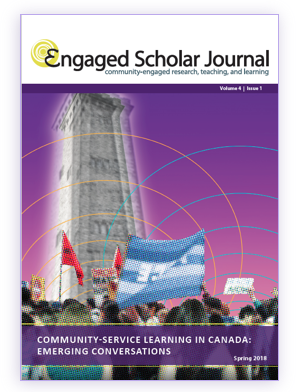Imagination Practices and Community-Based Learning
DOI:
https://doi.org/10.15402/esj.v4i1.318Abstract
Informed by my experiences in prison/university co-learning projects, this essay centres two community-based learning practices worth cultivating. First, what can happen when all participants truly prioritize what it means to build community as they address their shared project, co-discovering new ways of being and doing together, listening receptively and speaking authentically? How can project facilitators step beyond prescribed roles embedded in the charity paradigm of service-learning to invite and support egalitarian community and equity-driven decision-making from a project’s inception and development, through its unfolding and its assessment? Second, the sheer fact of a project taking place in the marginal place between two contexts gives all participants—students, faculty, community participants and hosts—the opportunity for meta-reflection on the institutional logics that construct and constrain our perspectives so acutely. What can we do, by way of project-conception and pedagogy, to open up those insights? The vantage that “the space between” provides can bring fresh understanding of the systemic forces at work in the lives of the community participants. And the university’s assumptions about itself and its place in the world can also suddenly appear strange and new, objects of scrutiny for students and community members both.
Downloads
Published
How to Cite
Issue
Section
License
Authors who publish with this journal agree to the following terms:
- Authors retain copyright and grant the journal right of first publication with the work simultaneously licensed under a Creative Commons Attribution License CC BY 4.0 that allows others to share the work with an acknowledgement of the work's authorship and initial publication in this journal.
- Authors are able to enter separate, additional contractual agreements for the non-exclusive distribution of the journal's published version of the work (e.g., post it to an institutional repository or publish it in a book), with an acknowledgement of its initial publication in this journal.
- Authors are permitted to post their work online (e.g., in an institutional repository or on their website) after the publication of their work in the Engaged Scholar Journal.
- Please note that while every opportunity will be taken to ensure author participation in the editing process, due to time constraints final copyediting changes may be made before publication to ensure APA adherence throughout all submissions.




